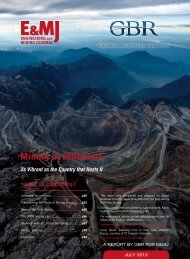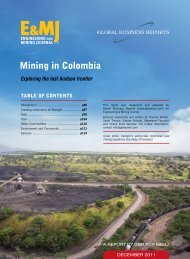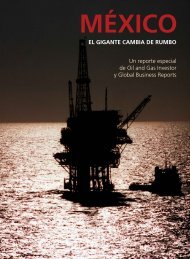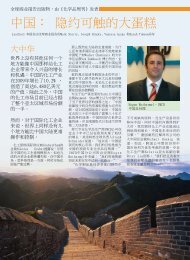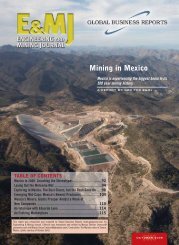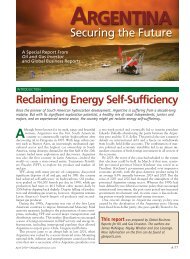Energy Handbook 2011 - GBR
Energy Handbook 2011 - GBR
Energy Handbook 2011 - GBR
You also want an ePaper? Increase the reach of your titles
YUMPU automatically turns print PDFs into web optimized ePapers that Google loves.
P o w e r S u m m i t - T h e E n e r g y H a n d b o o k 2 0 1 1<br />
C o u n t r y P r o f i l e : S i n g a p o r e<br />
As well as finance, power plant<br />
projects also need insurance to make<br />
risks manageable. One specialist in the<br />
business is FM Global, an insurance<br />
company whose unique approach to risk<br />
has distinguished it from other players in<br />
the field. Boasting a history going back<br />
almost 200 years, FM Global is run by<br />
engineers and is the insurance provider<br />
of choice for most of Singapore’s power<br />
generation companies.<br />
FM Global’s hands-on approach toward<br />
ensuring that power plants will run safely<br />
is part of the reason why the company<br />
now insures 7% of all generation capacity<br />
worldwide. Peter Madeley, who runs the<br />
company’s operations in Asia Pacific,<br />
explains: “We spend several days at each<br />
power plant, in order to physically see<br />
the facility and the protective devices and<br />
witness the critical equipment tests. We<br />
need to conduct a very comprehensive<br />
review, so that the client knows that when<br />
the FM consultation has been complete,<br />
they can be sure that their protective<br />
devices will work as designed.”<br />
Actsys<br />
The service sector also has plenty of room<br />
for independent engineering consultancies,<br />
of which one example is Actsys. Starting<br />
as a one-man company, Actsys has<br />
grown into the leading energy efficiency<br />
consultancy for the power industry in<br />
Singapore and beyond. Celebrating its<br />
10th anniversary this year, Actsys was<br />
founded by Norman Lee, a chemical<br />
engineer who has used his experience in<br />
the process sector to increase efficiency<br />
and operating capacity in energy-related<br />
industries.<br />
So what we do is create our own very<br />
detailed thermodynamic model of the<br />
plant. We are then able to quantify which<br />
respective parts of the plant are losing<br />
energy efficiency, and further tell them<br />
how to do their plant maintenance.”<br />
Actsys has worked with the all the major<br />
Singaporean power plants year after year,<br />
and has now expanded to offer its services<br />
elsewhere. With many power plants in<br />
the region experiencing efficiency issues,<br />
Actsys is well positioned to offer its<br />
services more broadly.<br />
“Our track record sells us, and we need<br />
to be manning up to expand,” Lee says.<br />
“Unfortunately people taking on our<br />
services have to overcome the inertia that<br />
they have built up by operating power<br />
plants for 30–40 years without ever<br />
seeing a value in our work. When they<br />
see the results, then they realise what<br />
they have been missing out on for such<br />
a long time. However, to demonstrate<br />
these results takes time and effort.”<br />
With a total population of around 5m, one<br />
of the major challenges facing Singapore<br />
has been finding the appropriate talent<br />
to support the country’s industries. As a<br />
result, Singapore has attracted numerous<br />
professional recruitment agencies eager<br />
to become the talent supplier of choice<br />
for the region.<br />
Recent steps taken by the government,<br />
such as relaxing the visa regime to allow<br />
contractors to sponsor themselves for a<br />
five-year stay, have also improved the<br />
situation. Mark Sparrow, the head of<br />
ASEAN for recruitment company Kelly<br />
Services, explains the result of this<br />
change: “Professionals in the energy<br />
industry whose contracts run out, but<br />
who want to stay in Singapore, are now<br />
able to search for another job here. While<br />
this may sound like an insubstantial<br />
tweak, it made a massive difference in<br />
retaining intellectual property within the<br />
country. It’s something the government<br />
has done to retain a lot of good talent<br />
within Singapore’s shores.”<br />
personnel in the power industry increases.<br />
Companies like Robert Walters, which now<br />
has a strong presence over south-east<br />
Asia and 100 people in Singapore, has<br />
specific teams targeting the engineering<br />
and energy sectors. While competition<br />
between professional recruitment agencies<br />
has been particularly fierce, it has not<br />
stopped others from entering the market.<br />
EarthStream was established in Singapore<br />
less than two years ago and already has 70<br />
people, nine global offices and a database<br />
of over 160,000 energy specialists.<br />
Founder and CEO Kevin Gibson thinks<br />
that increased specialisation in the energy<br />
sphere makes EarthStream different. “As<br />
a recruitment firm we are not focused on<br />
finding very general skill levels – rather<br />
we like to find very specialised skills sets<br />
on the engineering and technical side of<br />
things,” he says. “We are also looking at<br />
enhancing the skill transference process,<br />
so that individuals who have good<br />
experience in generation or transmission<br />
in one industry, like oil and gas, are able<br />
to transfer their skills to other industries<br />
like clean energy.”<br />
Industry Outlook<br />
After a record GDP growth year in 2010,<br />
Singapore is well placed to strengthen<br />
its position in the energy sector. With<br />
the domestic power market growing<br />
and expanding, Singapore continues to<br />
showcase its liberalised market structure<br />
and influence its neighbours to open<br />
up their power sectors as well. A rising<br />
star in the renewable energy sector, the<br />
country’s R&D sector continues to attract<br />
companies from many areas within clean<br />
tech. The incoming LNG terminal will see<br />
Singapore continuing to establish itself as<br />
a trading centre for all of south-east Asia<br />
over the course of the decade. Singapore’s<br />
track record demonstrates that it is well<br />
positioned for investment in a variety<br />
of spheres, and much of the incoming<br />
investment trickles down to Singapore’s<br />
regional neighbours. Singapore is never<br />
more than a five-hour flight from Asia<br />
Pacific’s most prosperous economic<br />
centres, underlining its central location.<br />
Areas for improvement remain: Singapore<br />
will have to address further the efficiencies<br />
of its plants as well as the never-ending<br />
struggle to locate suitable talent, a task<br />
the country’s small population makes<br />
especially difficult. The regulatory and<br />
legal framework is important, but not<br />
the most significant factor. Instead, as<br />
Ng Quek Peng of GMR puts it: “I cannot<br />
overemphasise Singapore as a society<br />
positioned for investment. When Chinese,<br />
Indians, Malaysians and even Caucasians<br />
come here they feel at home, and this<br />
creates a very conducive environment<br />
for everybody to invest in Singapore. We<br />
come and invest here not because of the<br />
legal or economic system, but because of<br />
Singapore’s society’s ability to make us<br />
feel very much at home.”<br />
“The main area facing the power sector<br />
where we can help is by doing energy<br />
audits and performance management,”<br />
Lee says. “What this means is if a<br />
power plant is going for an inspection or<br />
maintenance shutdown, they would like<br />
to know which parts of their plant are<br />
not performing well, especially in terms<br />
of efficiency. Power producers often do<br />
not have this capability themselves. They<br />
understand that they might not be running In an effort to remain competitive,<br />
at full efficiency but they are not able to professional recruitment agencies have<br />
put a finger on which respective parts also been increasing their focus on energy<br />
of the plant are losing their efficiency. and engineering as demand for specialised<br />
58 59



